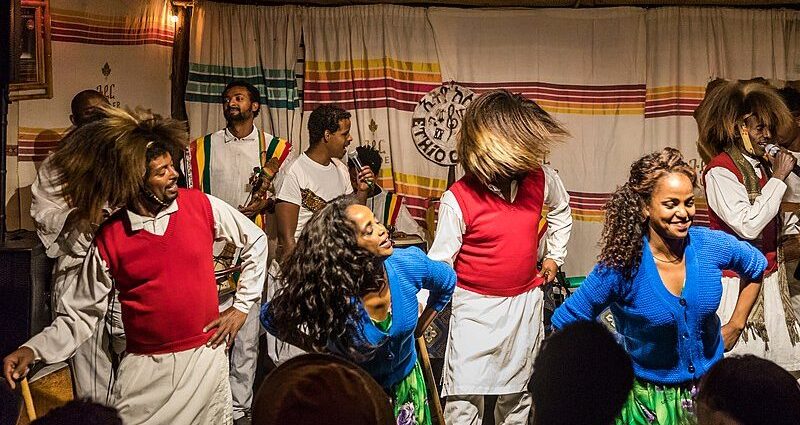In the bustling city of Addis Ababa, Ethiopia, visitors flock to Fendika cultural hub to listen to live Ethiopian music. Nestled away in the Kazanchis neighborhood, stepping into this azmari bet (Amharic for a traditional music house) feels like a family reunion. The cozy, sprawling complex of rooms hosts a music space, an art gallery and an Ethiopian eatery and coffeehouse, welcoming travelers and locals to revel in the joy of live music and poetry since the 1990s — when azmari bets were still abundant.
Today, due to rapid development and expansion in Addis Ababa, Fendika remains one of the only traditional music houses in Kazanchis. When Melaku Belay, a traditional dancer and musician, began managing Fendika in 2008, he transformed Fendika into a more comprehensive performing arts space, setting up systems to ensure that all 33 Fendika staff and performing artists receive salaries instead of tips. His vision led to the establishment of the Fendika Cultural Center in 2016.
This month, Fendika accepted a prestigious Prince Claus Award from the Netherlands’ Prince Claus Fund for Culture and Development, in recognition of their groundbreaking work in the advancement of culture and development within Ethiopia. Fendika is one of only seven 2020 Prince Claus Laureates announced in an online ceremony on December 2.
“Being connected to our identity helps us move forward,” Belay told Prince Claus. “What makes our work unique is that we keep our traditions alive through art. …Deep human connection can only be forged through art,” he continued.
The award recognizes Fendika as a “catalyst” that inspires and supports creative expression — from traditional to contemporary — within Ethiopia, and through its many global partnerships and collaborations.
According to Fendika’s website, the Ethiocolor Traditional Band has been performing at Fendika every other Friday since 2009, “drawing standing-room-only crowds,” while maintaining a robust touring schedule around the world, from France to Israel, the USA to Zanzibar.
During the pandemic, Fendika has been hit like so many other public gathering spaces in Ethiopia. Their touring schedule was halted and they decided to shut down Fendika in Addis Ababa, on March 16, just a few days before the government issued a shutdown of all live performance venues, only to shift online with engaging YouTube and Facebook-based live performances. Belay never skips a beat when it comes to staying connected through the arts and he and his team managed to pull off live performance online despite endless challenges with a lack of steady internet connectivity and internet shutdowns due to political instability in Ethiopia.
Fendika’s shows always come with a message of love, justice and unity, and these values permeate and shape all of its programs, as seen here in this live show streamed online on May 28.
Founding president of the Ethiopian Dance Association, Belay wows audiences with his high-energy, entrancing interpretations of eskista, the Amhara traditional cultural dance that focuses on rapid shoulder-shaking. His mastery of this dance form “earned him the nicknames of ‘walking earthquake’ and ‘King of Eskista,’” according to Fendika’s website. Belay is self-taught, learning most of Ethiopia’s traditional dances while growing up as a street kid in the 80s in Addis Ababa.
An avid music lover, Belay has won numerous awards for his arts advocacy and leadership while remaining down to earth in his love for sharing music, including fantastic sessions as “DJ Melaku” featuring Ethiopian jazz legends.
As Addis continues to change and azmaris disappear in the name of development, Belay and the Fendika community continues to fight for the preservation and development of Ethiopian performance culture and heritage — especially azmari heritage.
